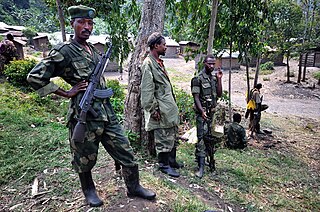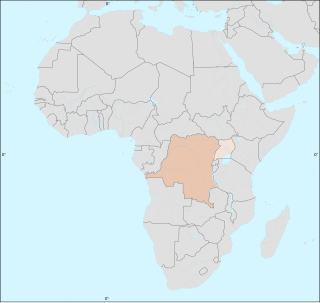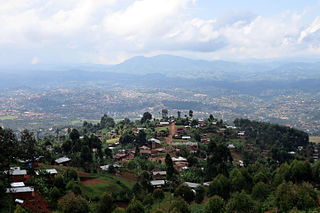Related Research Articles

The Democratic Republic of the Congo (DRC) is a country in Central Africa bordered to the west by the South Atlantic Ocean. By area, the DRC is the second-largest country in Africa and the 11th-largest in the world. With a population of around 108 million, the Democratic Republic of the Congo is the most populous officially Francophone country in the world. The national capital and largest city is Kinshasa, which is also the nation's economic center. The country is bordered by the Republic of the Congo, Central African Republic, South Sudan, Uganda, Rwanda, Burundi, Tanzania, Zambia, Angola, and the Cabinda exclave of Angola.

North Kivu is a province bordering Lake Kivu in the eastern Democratic Republic of the Congo. Its capital is Goma.

The United Nations Organization Stabilization Mission in the Democratic Republic of the Congo or MONUSCO, an acronym based on its French name Mission de l'Organisation des Nations Unies pour la stabilisation en République démocratique du Congo, is a United Nations peacekeeping force in the Democratic Republic of the Congo (DRC) which was established by the United Nations Security Council in resolutions 1279 (1999) and 1291 (2000) to monitor the peace process of the Second Congo War, though much of its focus subsequently turned to the Ituri conflict, the Kivu conflict and the Dongo conflict. The mission was known as the United Nations Mission in the Democratic Republic of Congo or MONUC, an acronym of its French name Mission de l'Organisation des Nations Unies en République démocratique du Congo, until 2010.

The term Mai-Mai or Mayi-Mayi refers to any kind of community-based militia group active in the Democratic Republic of the Congo (DRC) that is formed to defend local communities and territory against other armed groups. Most were formed to resist the invasion of Rwandan forces and Rwanda-affiliated Congolese rebel groups, but some may have formed to exploit the war to their own advantage by looting, cattle rustling or banditry.

Goma is the capital of North Kivu province in the eastern Democratic Republic of the Congo. It is located on the northern shore of Lake Kivu, next to the Rwandan city of Gisenyi. The lake and the two cities are in the Albertine Rift, the western branch of the East African Rift system. Goma lies only 13–18 km (8.1–11.2 mi) south of the active Nyiragongo Volcano. The recent history of Goma has been dominated by the volcano and the Rwandan genocide of 1994, which in turn fuelled the First and Second Congo Wars. The aftermath of these events was still having effects on the city and its surroundings in 2010. The city was captured by rebels of the March 23 Movement during the M23 rebellion in late 2012, but it has since been retaken by government forces.

The Allied Democratic Forces is an Islamist rebel group in Uganda and the Democratic Republic of the Congo (DRC), considered a terrorist organisation by the Ugandan government. It was originally based in western Uganda but has expanded into the neighbouring DRC.

Primary education in the Democratic Republic of the Congo (DRC) is not free or compulsory.

The Kivu conflict began in 2004 in the eastern Congo as an armed conflict between the military of the Democratic Republic of the Congo (FARDC) and the Hutu Power group Democratic Forces for the Liberation of Rwanda (FDLR) in the Democratic Republic of the Congo. It has broadly consisted of three phases, the third of which is an ongoing conflict. Prior to March 2009, the main combatant group against the FARDC was the National Congress for the Defence of the People (CNDP). Following the cessation of hostilities between these two forces, rebel Tutsi forces, formerly under the command of Laurent Nkunda, became the dominant opposition to the government forces.

Health problems have been a long-standing issue limiting development in the Democratic Republic of the Congo.

The Democratic Republic of the Congo, and the east of the country in particular, has been described as the "Rape Capital of the World," and the prevalence and intensity of all forms of sexual violence has been described as the worst in the world. Human Rights Watch defines sexual violence as "an act of a sexual nature by force, or by threat of force or coercion," and rape as "a form of sexual violence during which the body of a person is invaded, resulting in penetration, however slight, of any part of the body of the victim, with a sexual organ, or of the anal or genital opening of the victim with any object or other part of the body."

The March 23 Movement, often abbreviated as M23 and also known as the Congolese Revolutionary Army, is a rebel military group that is for the most part formed of ethnic Tutsi. Based in eastern areas of the Democratic Republic of the Congo (DRC), it operates mainly in the province of North Kivu. The M23 rebellion of 2012 to 2013 against the DRC government led to the displacement of large numbers of people. On 20 November 2012, M23 took control of Goma, a provincial capital with a population of a million people, but it was requested to evacuate it by the International Conference on the Great Lakes Region because the DRC government had finally agreed to negotiate. In late 2012, Congolese troops, along with UN troops, retook control of Goma, and M23 announced a ceasefire and said that it wanted to resume peace talks.
Chambucha is a location in Walikale Territory, North Kivu, Democratic Republic of the Congo.

The Allied Democratic Forces insurgency is an ongoing conflict waged by the Allied Democratic Forces in Uganda and the Democratic Republic of the Congo, against the governments of those two countries and the MONUSCO. The insurgency began in 1996, intensifying in 2013, resulting in hundreds of deaths. The ADF is known to currently control a number of hidden camps which are home to about 2,000 people; in these camps, the ADF operates as a proto-state with "an internal security service, a prison, health clinics, and an orphanage" as well as schools for boys and girls.
The following lists events that happened during 2014 in the Democratic Republic of the Congo.
The following lists events that happened during 2012 in the Democratic Republic of the Congo.

The Kivu Ebola epidemic was an outbreak of Ebola virus disease (EVD) that ravaged the eastern Democratic Republic of the Congo (DRC) in Central Africa from 2018 to 2020. Between 1 August 2018 and 25 June 2020 it resulted in 3,470 reported cases. The Kivu outbreak also affected Ituri Province, whose first case was confirmed on 13 August 2018. In November 2018, the outbreak became the biggest Ebola outbreak in the DRC's history, and had become the second-largest Ebola outbreak in recorded history worldwide, behind only the 2013–2016 Western Africa epidemic. In June 2019, the virus reached Uganda, having infected a 5-year-old Congolese boy who entered Uganda with his family, but was contained.
Attacks were carried out by various armed groups in the Democratic Republic of the Congo in 2021 and 2022. The attacks have killed 629 and injured 321. At least 82 perpetrators were also killed and one injured in these attacks.
Events in the year 2021 in the Republic of the Congo.

Luca Attanasio, the Italian ambassador to the Democratic Republic of the Congo, was killed on 22 February 2021 along with two other people when a World Food Programme (WFP) delegation travelling on a field visit was attacked by armed individuals. The two-vehicle convoy with seven people was travelling in the Congolese province of North Kivu, from the province's capital of Goma to a WFP school feeding programme in Rutshuru, a town 70 kilometres north of Goma, on a route that would have taken the vehicles through Virunga National Park. The attack occurred at 10:15 a.m. local time near the townships of Kibumba and Kanyamahoro. The WFP and North Kivu governor Carly Nzanzu said the convoy did not have a security escort at the time of the attack.

On 7 February 2021, the Congolese health ministry announced that a new case of Ebola near Butembo, North Kivu had been detected the previous day. The case was a 42-year-old woman who had symptoms of Ebola in Biena on 1 February 2021. A few days after, she died in a hospital in Butembo. The WHO said that more than 70 people who had contact with the woman had been tracked.
References
- ↑ "L'UNICEF condamne les tueries d'enfants au Nord et au Sud Kivu en RD Congo". UNICEF (in French). 22 May 2012. Archived from the original on 4 March 2016. Retrieved 2 June 2012.
- ↑ "UNICEF condemns killings of children in North and South Kivu of Democratic Republic of the Congo". Archived from the original on 18 February 2015.
- ↑ "UNICEF condemns killings of children in North and South Kivu in DR Congo". ReliefWeb. UNICEF. 22 May 2012. Retrieved 10 February 2023.